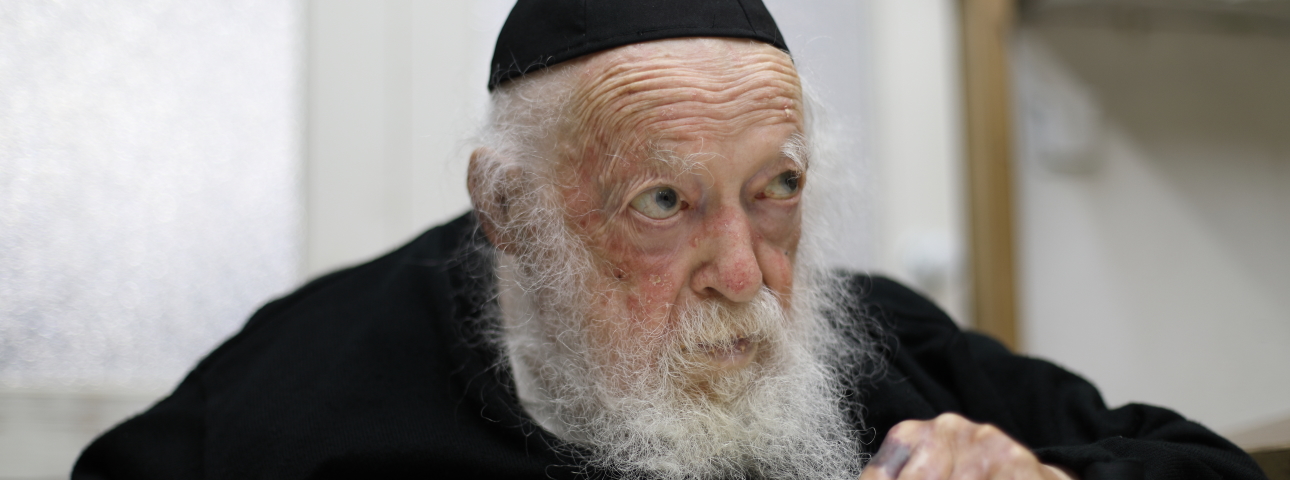Rabbi Kanievsky’s Passing Symbolizes Further Decentralization of Haredi Leadership
For now, no one in the next cadre of prominent Lithuanian rabbis stands out as likely to inherit the leadership mantle at a relatively young age.

Rabbi Kanievsky z"l | Flash 90
Rabbi Chaim Kanievsky was unlike his predecessors in the line of Lithuanian (non-hassidic) gedolei ha’dor (greatest rabbis of the generation). Rabbi Shach was a charismatic leader; Rabbi Elyashiv was a brilliant rationalist; Rabbi Steinman was an outstanding educator. By contrast, Rabbi Kanievsky attained his leadership position by virtue of his long hours of Torah study, his righteous conduct and the miracles ascribed to him. For years, his dilapidated apartment in Bnei Brak was open to all those who came to consult him, to pose halachic questions and who sought his blessing – all absolutely sure that his famous mantra beracha ve’hatzlahah (blessing and success) was sure to come to pass.
People of every ultra-Orthodox stream and even many who were not ultra-Orthodox, flocked to his home. This is also why his non-elitist leadership allowed him to eradicate the dividing line between the Lithuanian, hassidic, and Sephardi streams and to win the sweeping adoration of the entire ultra-Orthodox community, and of those even beyond its boundaries.
Rabbi Kanievsky was fully immersed in Torah study and he fit the definition of a full-time Torah scholar perfectly. The famous video from the early days of the COVID-19 pandemic, in which he was asked whether it was permissible to shut down the heders (elementary schools for boys), clearly reflects his detachment from the vanities of this world and his strong faith that Torah study was the proven way to combat the plague. His life of righteousness made it necessary to create a sort of hassidic court around him. This court, orchestrated by his grandson Yanky, regulate influenced decisions in every domain of the ultra-Orthodox world – political, public or personal.
Precisely because these matters were so far from Rabbi Kanievsky’s mind, his court amassed unprecedented power. In the past, Israeli politicians made pilgrimages to the leading rabbi of the generation, such as Rabbi Ovadia Yosef and Rabbi Shach. In Rabbi Kanievsky’s time, the visit with him was only symbolic, because the political deal had already been worked out with his grandson.
Rabbi Kanievsky’s fame and the dominant position of his court overshadowed the other leading rabbi of the Lithuanian community today, Rabbi Gershon Edelstein. For the foreseeable future, Rabbi Edelstein, who will be 99 next month, will be the sole authority for most of the Lithuanian community. In several respects, Rabbi Edelstein resembles his predecessors. He is one of the heads of the prestigious Ponevezh Yeshiva, deeply learned, a rationalist and more in touch with daily life than was Rabbi Kanievsky.
During the pandemic he has stood out as being most meticulous about compliance with health regulations. His attitude towards the State of Israel and to those who serve in the military is tolerant. But, these are merely nuances. We must not expect him to introduce dramatic changes in the relations between the ultra-Orthodox, the State of Israel and the secular public, even though he will not lead an extremist line.
Like Rabbi Kanievsky, Rabbi Edelstein will not wield the same power over the Lithuanian community that Rabbi Shach did twenty years ago. The growth and diversification of the community, as well as the fact that in recent years the gedolei ha’dor have already been close to age 90 when they achieved that status, means that although their symbolic importance has not waned, their actual influence over the community’s needs and individuals’ decisions, continues to decline.
For now, no one in the next cadre of prominent Lithuanian rabbis stands out as likely to inherit the leadership mantle at a relatively young age. We can anticipate that authority will continue to be decentralized. One result is that individual members of the community will feel increasingly empowered to make their own decisions about their lives – a change that may have much more dramatic implications than the specific identity of the next gadol ha’dor.
The article was published in the Jerusalem Post.
